

PhD in Maritime Affairs
Phd in maritime affairs.
The PhD programme has seven active areas of research and a growing school of doctoral students. WMU has a strong tradition of interdisciplinary research at the doctoral level, and has won a large number of externally funded projects, often working in collaboration with partners from industry and government. The structure of the PhD programme makes it flexible and responsive to the needs of both full-time students based in Malmö and candidates based mainly at their employing organization.
WMU’s PhD programme offers students the opportunity to carry out research across the maritime field, but with an emphasis on issues related to the International Maritime Organization’s mission of maritime safety, security and marine environmental protection. Our PhD programme offers unrivalled access to international maritime experts both inside and outside academia, and to organizations working at the forefront of research and development.
PhD students have come to WMU from industry, academia and the government sector, and have completed their dissertations in a very wide range of subject areas, from investigating oil-spill mitigation to an analysis of organizational learning in shipping companies.
PROGRAMME DETAILS
The credit system The PhD programme consists of 240 ECTS credits completed usually over a registration period of three to six years. Candidates may be based at the University or elsewhere, usually at their place of employment.
Within the time limits of three to six years, candidates may carry out doctoral research at their own pace, which can also vary during their period of enrolment. For example, candidates may choose to spend one year conducting research at WMU full time, and then return home to complete their research over a longer period, with short visits to the University for progression seminars and meetings. 1 ECTS credit (EC) is approximately 25 study load hours. One academic year is generally 60 EC, or 1500 study load hours, or 36 hours per week over an academic year of 20 weeks. For someone who is studying part-time, the average study load will vary.
Individual Study Plan (ISP) Each candidate will have an Individual Study Plan, agreed with the supervisor(s) and the Director of the PhD programme. This will include the compulsory Research Methods subject (20EC), appropriate taught subjects related to the field of research (40 EC), plus a timetable for the completion of the dissertation, plans for publication in learned journals, and attendance at conferences and seminars.-
Progression During the first phase of doctoral studies, candidates complete the research methodology subject, and develop their research proposals. At the end of this initial period, the first progression seminar is held, at which candidates each present their research proposals.
Throughout the doctoral programme, the candidates attend taught subjects and also the further progression seminars, where the candidates present their work to date and their research plans for the next twelve-month period. After every seminar, the Progression Board meets, and considers the candidate’s progress. At this Board meeting, decisions are taken as to whether the candidate is to be permitted to progress to the next stage of the research.
A candidate’s enrolment can be terminated at any point if his/her progress is not considered to be satisfactory.
Advanced standing A candidate who has completed part of a doctoral degree elsewhere may transfer into the WMU programme with advanced standing. Their period of enrolment at WMU will vary in line with the amount of research they have already completed, but the minimum permissible period of enrolment must include at least two progression seminars and the dissertation (180 EC). A candidate with advanced standing must be registered for at least 12 months.
Supervision All doctoral students have a principal supervisor who is a member of the resident faculty. According to the topic of research, a student may also have a co-supervisor, who may be a member of the resident faculty, a Visiting Professor or a suitable person from outside the University.
APPLICATION FOR ADMISSION
All candidates must complete their applications online through the WMU website, attaching a detailed research proposal outlining the objectives and methodology of their research. In addition, they should arrange for two letters of academic reference from people familiar with their suitability for doctoral research. Certified copies of transcripts and certificates (including the results of an internationally recognized test of English language) supporting the qualifications listed on the form, must be uploaded.
When an academically cleared candidate has paid the first fee instalment, enrolment can be finalized. At this point, each candidate will receive a medical report form, which must be returned to the University, along with a formal declaration that the candidate accepts the conditions of his/her enrolment.
APPLY ONLINE
Programme details.
Within the time limits of three to six years, candidates may carry out doctoral research at their own pace, which can also vary during their period of enrolment. For example, candidates may choose to spend one year conducting research at WMU full time, and then return home to complete their research over a longer period, with short visits to the University for progression seminars and meetings. 1 ECTS credit (EC) is approximately 25 study load hours. One academic year is generally 60 EC, or 1500 study load hours, or 36 hours per week over an academic year of 20 weeks. For someone who is studying part-time, the average study load will vary.
Individual Study Plan (ISP) Each candidate will have an Individual Study Plan, agreed with the supervisor(s) and the Director of the PhD programme. This will include the compulsory Research Methods subject (20EC), appropriate taught subjects related to the field of research (40 EC), plus a timetable for the completion of the dissertation, plans for publication in learned journals, and attendance at conferences and seminars.
Entrance Requirements
The Admissions Board will consider only those applicants who meet the minimum general entrance requirements, which are:
- a Master’s degree, with a dissertation, in a relevant discipline, or an equivalent university qualification
- competence in English language, demonstrated by an internationally recognized standard test
- computer competence
The Admissions Board will select only the best-qualified candidates, taking into account all their qualifications and achievements. The Admissions Board may require applicants to appear for an interview, either on-campus or through remote video, as part of the admissions process.
Tests of English Applicants must offer one of the following tests of English language: Test of English as a Foreign Language (TOEFL) 96+ in the internet-based test 590+ in the paper-based test WMU’s TOEFL institution code is 9198
International English Language Testing System (IELTS) band 7.0 or above
Cambridge Examinations Cambridge Proficiency Examination at grade A or B
GCE O-level or the equivalent a good pass grade
More information on these examinations may be obtained through the following websites:
www.toefl.org www.ielts.org www.cambridgeesol.org
Fees & Costs
The full University fee is USD 37,925, and is charged in four approximately equal instalments. The first instalment is paid on enrolment, while subsequent instalments are paid prior to the second, third, and fourth progression seminars. The tuition fee includes supervision, library and laboratory access, IT support, and medical, life and accident insurance.
In addition, a student needs around SEK17,000 per month for rent and general living costs in Malmö, plus air tickets.Other sources of financial support (for example, the US Department of Veterans Affairs) may be accessed by candidates.
Payments to the University
Payments to the University should be sent to:
Account Name: The World Maritime University Account Number: 3968-77-02567 IBAN Number: SE66 3000 0000 0396 8770 2567 BIC Code: NDEASESS Bank Name: Nordea Bank Address: PO Box 24, SE-201 24 Malmö, Sweden
Details of the transfer of funds should be sent to the Registry by email ([email protected]).
Research Priority Areas
Doctoral research at WMU falls mainly within one of the following research priority areas (RPAs). Additionally, the WMU programme also offers excellent opportunities for interdisciplinary projects, allowing doctoral candidates to pursue their own, and their organization’s, particular interests.
Environmental Impacts of Marine Activities
This RPA is linked to the precarious state of the environment in respect of life due to human activities. Research in this area will seek to explore the effects of maritime activities on the natural environment, ways (at policy and operational levels) of limiting and ideally avoiding such effects, and the development of new and sustainable practices for the maritime industry. This research area also offers opportunities to contribute toward the achievement of SDG14 targets through investigation of the global social-ecological system that interconnects the oceans, coasts and land.
Maritime and Marine Technology and Innovation
This RPA interrogates developments of technology in ship operations (including the evolution of automation and digitalization), education and training (including e-learning), ship safety, information and communication for ship business (e-documentation) and its effect on the social, legislative and administrative dimensions of shipping. The cross-cutting nature of technology and innovation establishes an almost universal link between this RPA and all the other RPAs.
Maritime Economics and Business
This RPA focuses on the optimization of shipping, ports and their sustainable management from economic and logistics/supply chain perspectives. It explores all areas of shipping and port management, and offers the chance of carrying out in-depth investigation within the fields of maritime economics and policy, shipping and/or port operations and management, and shipping finance and portfolio management, as well as in such related fields as global supply chains and maritime logistics, port governance. and performance, and maritime analytics using big data.
Maritime Energy Management
This RPA seeks to advance the knowledge in the Maritime Energy Management field by conducting world-class fundamental and applied research in the thematic areas of energy efficiency, regulatory frameworks, renewable energy, social factors related to energy, the economics of energy and energy-related technology/innovation. The thematic areas will be addressed using a ship life-cycle perspective (design, production, operation and recycling) and in consideration of the impacts of shipping on oceans, through ports and to shipyards.
Maritime Law, Policy and Governance
This RPA focuses on maritime legislative and administrative requirements and the policies that are associated with them at the international, regional and national levels. Of particular interest is the inquiry into processes related to the design, formulation, and evaluation of maritime law and policy. This includes examining performance monitoring systems using such tools as benchmarking and auditing. Also of particular importance is the research into implementation mechanisms, e.g., under the legal enforcement regimes prescribed by the IMO, ILO and other UN bodies.
Maritime Safety
This RPA focuses on complex concepts and models of safety and their influence on operations at sea and ashore. It will examine digitalization, artificial intelligence and machine learning in a simulation context. It will also explore how safety and security can be improved through policy, legislation, social dynamics (human factors/ergonomics), accident aetiology, and simulation. The research area also covers the increasing disruption by technology of traditional approaches to maritime operations and the consequences of this on operational safety, security, human factors and labour supply.
Maritime Social and Labour Governance
This RPA focuses on organizational behaviour and decision-making processes by examining dynamics of corporate interaction, in particular in global networks and supply-chains, and with humans. It also seeks to interrogate issues related to individuals and organizations and their development through education, training and organizational learning. It aims to create a better understanding of the interactions between humans and organizations in order to optimize well-being and overall performance and in particular the role of education in this regard.
WMU-Sasakawa Global Ocean Institute
The WMU-Sasakawa Global Ocean Institute carries out and coordinates research in line with its vision to act as an independent focal point for the ocean science-policy-law-industry-society interface where policy makers, the scientific community, regulators, industry actors, academics, and representatives of civil society meet to discuss how best to manage and use ocean spaces and their resources in accordance with the UN SDGs. Through evidence-based research, the Institute seeks to provide new perspectives on how to address the manifold threats facing the ocean.
For more information contact:

- Future Students
- Parents and Families
Department of Marine Affairs
College of the environment and life sciences.
- News and Events
Marine Affairs Ph.D.
- Dissertation
- Funding Resources
the focus of the Ph.D. program is on coastal/ocean management, policy, and law and will concentrate on the following areas, which are not mutually exclusive:
- Coastal management
- Fisheries management
- Marine ecosystem management
- Maritime transportation and ports
- National and international ocean policy
- Marine human ecology
The University of Rhode Island has a wide breadth of graduate marine programs, making available a wide variety of courses in different disciplines which could become part of a student’s program of study. This is a substantial source of strength for students in Marine Affairs and provides for a number of unique educational opportunities.
The Department of Marine Affairs is an interdisciplinary department, with a faculty educated in the fields of geography, political science, law, anthropology, environmental planning, and oceanography. It further draws upon the expertise of associated departments and programs such as the Departments of Environmental and Natural Resource Economics, Natural Resource Sciences, Political Science, Fisheries, Aquaculture, and Veterinary Science and Community Planning as well as the Graduate School of Oceanography.
The Ph.D. program in Marine Affairs is designed to serve the needs of individuals who will be working in government, research institutes, consulting, and academia.
Several assistantships are available for support of Ph.D. candidates during the anticipated two year period while students are completing course work. Students who want to be considered for financial aid should submit completed applications by December 1.
- University Future Students
- University Current Students
- University Faculty & Staff
- Former Students
- University Catalog
- About the program
- How To Apply
Doctor of Philosophy in MCMS
The Ph.D. program in Marine and Coastal Management and Science (MCMS) at the Department of Marine Sciences, Texas A&M University at Galveston seeks to train the next generation of researchers and practitioners to address pressing problems at the nexus of the human and physical environment.
The MCMS Ph.D. Program
Investigating the nexus of coastal environments and society.
Increasing coastal population growth and development continues to threaten ecological and environmental systems, while people face increasing risk from natural hazards in the 21 st century. Resilient development of coasts in the face of threats from storms, coastal flooding, sea-level rise, and human alteration of natural environments is an issue of paramount global importance. These multifaceted problems demand specialists who are capable of bridging the silos between coastal science, policy development, and sustainable management.
Training Leaders
The MCMS Ph.D. program is an interdisciplinary program that is firmly grounded in both the social and physical sciences. The program’s emphases encompass the impacts and opportunities from the built environment and development, rigorous training in research methods and analytical procedures, and interdisciplinary approaches to research and learning—with a focus on the coastal and marine near-shore environments, where problems at the interface of the natural and built-environment are most pronounced. Through their interdisciplinary training, MCMS graduates will have a multitude of options for employment, ranging from academic and research institutions, government, industry, consulting, to non-governmental organizations.
The MCMS Ph.D. curriculum requires 60 hours for students entering with a Master’s degree, or 90 hours for those entering with an undergraduate degree. Core coursework includes a series of methodological, quantitative and theoretical courses. A flexible selection of courses on coastal management, geospatial analysis, living and nonliving resources, natural and technological hazards, and legal/ethical issues (chosen in consultation with the student’s faculty advisory committee) contextualize and ground the student’s research topic. Following coursework, students complete original research and a dissertation at the direction of a faculty advisory committee. Prospective students are encouraged to arrange a faculty chair prior to application, and must have agreement from a faculty chair before acceptance into the program. Various scholarships are available for competitive students at the MCMS program.
Dr. Wes Highfield Associate Professor [email protected] Phone: (409) 740-4726
Apply Today
At Texas A&M University at Galveston we offer a comprehensive array of degrees which are geared to make the most of our ideal location on the edge of the waters of the Gulf of Mexico. With programs ranging from marine biology to maritime administration led by enterprising professors at the top of their fields, we’re full of the opportunities you’re seeking.
Back to top Back to top
Contact Today
Curious? Want to know more? Let us point you in the right direction.
Texas A&M University Catalogs
Department of maritime business administration.
For more information on the Department of Maritime Business Administration, please visit http://www.tamug.edu/mara .
- Master of Maritime Business Administration and Logistics (MBAA) and Juris Doctor (JDLW) Combined Degree Program
- Master of Maritime Business Administration and Logistics in Maritime Business Administration and Logistics
- Maritime Business Administration Certificate
Maritime Administration
Mara 604 marine natural resource economics.
Credits 3. 3 Lecture Hours. Critical evaluation of policies and procedures in the development and use of natural resources relevant to marine and maritime markets; identification of problems in resource exploration, development, and transportation; the political /economic decision-making processes; analytical tools used to make economic decisions in resource markets. Prerequisite: Graduate status or special approval.
MARA 610 Maritime Strategic Management
Credits 3. 3 Lecture Hours. Introduction to the strategic management process, with an emphasis on the maritime industry in the domestic and international context; formulation of strategy in the context of environmental opportunities and threats, how to analyze industry competition, and how to implement strategies and build competitive advantage; selection of a company engaged in domestic or international waterborne commerce and analyze the strategic planning processes of the firm using the standard techniques such as SWOT analysis, the Five Forces model and the Value Chain analysis. Prerequisites: Approval of instructor, graduate classification or special approval.
MARA 612 Strategic Human Resource Management
Credits 3. 3 Lecture Hours. Leveraging the competitive value of human capital in organizations; exploration of current issues and practices associated with workforce management, legal and regulatory elements of managing employees, staffing, job analysis, performance management, discipline, compensation systems, benefits and termination; practical perspective methods of measuring the financial implications of human resource practices. Prerequisite: Graduate classification or approval of department head.
MARA 616 Management of Port Facilities and Infrastructure
Credits 3. 3 Lecture Hours. Problems associated with the management of buildings, piers, bulkheads and associated structures and connecting waterways focusing on corrosion, adverse affects of climate, tide and current affects, dredging cycles and related facilities access issues associated with structures in the coastal zone. Particular attention is paid to the requirements of state and federal agencies regarding equipment and facilities used in the safe loading, discharge, and storage of cargoes, including hazardous materials. Prerequisite: Approval of instructor, graduate status or special approval.
MARA 623 Maritime Economics Theory and Applications
Credits 3. 3 Lecture Hours. The role of domestic and international shipping in the American economy; discussion of the economic characteristics of waterborne transportation, including the nature of transport demand and cost functions; economic dimension of transport service; transport market structures; and transport pricing theory and practice; emphasis on managerial implications of transport economic principles for domestic and international shipping. Prerequisite: Approval of instructor.
MARA 624 Port Development and Intermodal Freight
Credits 3. 3 Lecture Hours. Survey of economic and operational characteristics of intermodal transportation, rail, trucking, air, shipping, and pipelines; emphasis on the interface of surface transportation with the maritime industry; pricing strategies, cost structures, and regulatory issues. Prerequisite: Approval of instructor.
MARA 625 Maritime Law and Policy
Credits 3. 3 Lecture Hours. Advanced topics in the maritime law and policy areas, national and international contexts; analytical and writing abilities as per practice in the maritime law; extensive use of web-based research methods within the maritime law context. Prerequisite: Approval of instructor.
MARA 627 Marketing of Maritime Services
Credits 3. 3 Lecture Hours. Marketing planning and analysis applicable to service firm; assessment of customer needs; quality control; competitive strategies; applications of marketing principles and practices to the maritime industry. Prerequisite: Approval of instructor.
MARA 636 Maritime Managerial Decision Making
Credits 3. 3 Lecture Hours. Construction of mathematical models of business environments; linear programming techniques; planning, analysis and control of operations in complex organizations through mathematical techniques. Prerequisite: Approval of instructor.
MARA 640 Global Logistics
Credits 3. 3 Lecture Hours. Transportation and logistic activities of multinational firms with an emphasis on transportation, customer service, inventory control facility location, global sourcing, customs documentation, and the role of government in importing and exporting. Attention is given to current events and their effects on the marketing and logistics activities of U.S. based organizations. Prerequisite: Approval of instructor, graduate status or special approval.
MARA 641 Maritime Financial Management
Credits 3. 3 Lecture Hours. Management of the corporation's sources and uses of funds with emphasis on risk and return, investment valuation, the selection of risky investment projects, capital structure, dividend policy, and methods of raising long-term capital; applications to the maritime industry are made where appropriate. Prerequisite: Approval of instructor.
MARA 645 Maritime Cybersecurity
Credits 3. 3 Lecture Hours. Basic terminology, concepts, technology, and trends of cybersecurity; foundations of cybersecurity to include cryptography, public key infrastructure, standards and protocols, physical security, network fundamentals; workings of systems, networks, infrastructure; legal and ethical issues in cybersecurity. Prerequisite: Approval of instructor.
MARA 647 Law and Policy in Cybersecurity
Credits 3. 3 Lecture Hours. Law and policy issues related to cybersecurity including procurement, operations, maintenance, governance, oversight, protection, defense; analyze law, policies, and regulations domestically and globally. Prerequisite: Graduate classification. Cross Listing: CSCE 702 and CYBR 602 .
MARA 650 Supply Chain Management
Credits 3. 3 Lecture Hours. Contemporary distribution logistics and integrated supply chain management; emphasis on customer service, transportation modes, inventory policies, warehousing, order processing and optimizing the logistics gross margin. Prerequisite: Approval of instructor, graduate status or special approval.
MARA 652 Marine Transportation System Design and Policy
Credits 3. 3 Lecture Hours. Interaction between shipping policy and design of marine transportation and port systems; effects of market structure on economics and finance; port performance and performance measures. Prerequisite: Approval of instructor, graduate status or special approval.
MARA 655 Cybersecurity Risk
Credits 3. 3 Lecture Hours. Risks in cybersecurity; avoidance, acceptance, mitigation or transference strategies; developing reliable cybersecurity risk assessments to include analysis, categorization and evaluation; cybersecurity risk audit frameworks. Prerequisites: Graduate classification. Cross Listing: CSCE 703 and CYBR 603 .
MARA 658 Port Design, Planning and Security
Credits 3. 3 Lecture Hours. Ground-level issues, tasks, and responsibilities that must be managed by the security manager in concert with the port director and federal and local law enforcement agencies; multiuse port facilities for recreation, hospitality, and external business and commercial interests; design of marine structures for the berthing, mooring, and repair of vessels. Prerequisite: Approval of instructor, graduate status or special approval.
MARA 660 Risk Assessment and Marine Insurance
Credits 3. 3 Lecture Hours. Theory, techniques, participants and background of risk assessment and management with emphasis given to contemporary issues in marine insurance law; marine liability coverage, cause of loss, additional perils, exclusions, warranties, duration of risk, adjustment clauses, operating clauses, civil commotions, war insurance, and project risk management techniques. Prerequisite: Approval of instructor, graduate status or special approval.
MARA 664 Maritime Production, Operations and Logistics Management
Credits 3. 3 Lecture Hours. Types of decisions to be made at varying levels and where appropriate; quantitative models and techniques that can be used in decision making areas of the firm; analysis of how the operations function fits in with other functional areas of the firm; interrelationships with firms' strategies. Prerequisite: Approval of instructor.
MARA 665 Maritime Business Analytics
Credits 3. 3 Lecture Hours. Deep understanding of the nature of big data and business analytics; practical toolkit applicable to the Maritime and Logistics field on how to perform big data analysis; ways to generate business value from in-house and open big data sets for the purpose of increasing competitiveness in the global marketplace; provision of evidence to sustain managerial claims, applying an analytical process that covers all activities from problem formulation to result communication and reflecting on and managing potential pitfalls. Prerequisite: Approval of instructor.
MARA 670 Coastal and Inland Waterways Transportation
Credits 3. 3 Lecture Hours. Policy, strategy and management, port and terminal development, competition with other modes of transportation, manpower, rates, environmental concerns, the impact of waterway systems on regional economies and national economic development; commercial aspects of the inland waterways with emphasis on operations, freight rate structures and applied cash flow methods. Prerequisite: Approval of instructor, graduate status or special approval.
MARA 672 Global Maritime Trading System
Credits 3. 3 Lecture Hours. Introduction to the theory of international waterborne trade; provides a basis for examining American foreign trade policy, and regional and world trade institutions such as the WTO, ASEAN, the EU, GATT, and NAFTA; includes international trade theory and policy, open-economy macroeconomic policy, tariffs, non-tariff barriers and enhancements, multinational enterprises and foreign direct investment, global competition and integration. Prerequisite: Approval of instructor.
MARA 673 International Maritime Industry Graduate Management Experience
Credits 1 to 4. 1 to 4 Lecture Hours. Combines clasroom and graduate research work with international travel and provides the student direct contact with maritime industry managers. The trip emphasizes cultural and historical aspects of the maritime industry outside of the United States providing a better understanding of differing management styles, business practices, and regulatory focus. Prerequisite: Graduate status.
MARA 675 Leadership in the Maritime Industry
Credits 3. 3 Lecture Hours. Focus on theory and real world practice of leadership; recognize components of leadership, management and labor; the basis of leadership authority, values and styles as applied to organizational vision, mission and life cycle; assess own leadership traits in preparation of entering work force. Prerequisite: Graduate classification or approval of instructor.
MARA 678 Service Operations Management
Credits 3. 3 Lecture Hours. Case-study on the management of service operations; an overview of the role of services in the economy, the experience-oriented and service-dominant logic in the pure service sector, and the extension of service functioning of manufacturing, government, and not-for-profits. Prerequisite: Graduate classification or approval of department head.
MARA 684 Professional Internship
Credits 1 to 4. 1 to 4 Other Hours. On the job training in the field of maritime administration and logistics. Prerequisites: Graduate classification; approval of department head.
MARA 685 Directed Studies
Credits 1 to 6. 1 to 6 Lecture Hours. Selected topics in an identified area of Maritime Administration and Logistics not covered in another course curriculum. Prerequisite: Approval of instructor.
MARA 689 Special Topics in...
Credits 1 to 4. 1 to 4 Other Hours. Selected topics in an identified area of Maritime Business Administration. May be repeated for credit. Prerequisites: Graduate classification and approval of instructor.
MARA 690 Maritime Interdisciplinary Studies - Business, Law and Policy
Credits 2. 2 Lecture Hours. Emphasis on cultural, economic, political, social and historical aspects of the maritime industry; coverage of different management styles, business practices and regulatory focus. Prerequisites: Graduate classification or approval of instructor.
MARA 691 Research
Credits 1 to 4. 1 to 4 Other Hours. Research methodologies and practices applicable to Maritime Business; for thesis or dissertation. Prerequisite: Graduate classification or approval of instructor.
Afenyo, Mawuli, Assistant Professor Maritime Business Administration PHD, Memorial University of Newfoundland, 2017
Bomer Galvao, Cassia, Assistant Professor Maritime Business Administration PHD, Pontificia Universidade Catolica, 2017
Caesar, Divine, Assistant Professor Maritime Business Administration PHD, University of Tasmania, 2016
Fertitta, Kelli, Instructional Assistant Professor Maritime Business Administration JD, South Texas College of Law, 2013
Hammady Brho, Mazen, Assistant Professor Maritime Business Administration PHD, University of North Texas, 2018
Jazayrli, Amer, Assistant Professor Maritime Business Administration PHD, KTH Royal Institute of Technoloy, 2020
Knox, Kris, Instructional Professor Maritime Business Administration PHD, University of Texas HSC at Houston, 1992
Miller, Emily, Visiting Lecturer Maritime Business Administration JD, Tulane University Law School, 2016
Mykoniatis, Nikolaos, Instructional Associate Professor Maritime Business Administration PHD, The Pennsylvania State University, 2013
Nwabueze, Uchenna M, Instructional Professor Maritime Business Administration PHD, Sheffield Hallam University, City Campus, 1995
Wang, Ping, Associate Professor Maritime Business Administration PHD, The Ohio State University, 2007
- Sorry, something went wrong here. We are currently experiencing issues with favourites.
- You have not marked any of our studies as your favourite. You can do so by clicking on the heart symbol when you find a programme that interests you.
- Postgraduate studies – PhD
- Our PhD programmes
- Nautical Operations

PhD in Nautical Operations – Joint Degree
The doctoral programme trains qualified candidates for research, teaching, dissemination and innovation work, and other activities where there is a requirement for scientific insight and an operational maritime focus.
Study facts
- Campus: Vestfold
- Credits: 180
- Duration: 3 years
- Teaching Language: English
Admission requirements
We require ta relevant 120-credit master's degree – based on a bachelor's degree of 180 credits – with good results, or an integrated master's degree of 300 credits. An individual assessment of the competence of applicants with a master's degree of less than 120 credits may be done. Other education equivalent to missing credits in the master's degree must be documented.
Academic background
Examples of fields of study that qualify for admission include maritime management, nautical studies, occupational and organisational psychology, fire and safety, meteorology and oceanography, marine engineering.
- How to qualify and be accepted into the programme external
About the programme
The National Joint PhD Programme in Nautical Operations is organised as a joint degree between the following four national higher education institutions offering professional maritime education:
- Universtity of Tromsø - The Arctic University of Norway (UiT)
- University of South-Eastern Norway (USN)
- Western Norway University of Applied Sciences (HVL)
- Norwegian University of Science and Technology (NTNU)
The National Joint PhD Programme in Nautical Operations will educate qualified candidates for research, teaching, dissemination and innovation work, and other activities requiring scientific insight and an operational maritime focus.
Implementation of complex nautical operations today requires interdisciplinarity and differentiated competence, including research expertise, for the safe and efficient planning, implementation and evaluation of nautical operations.
The programme has the following vision: to create an internationally recognized national PhD degree in nautical operations.
This vision will be achieved through the following overall objectives:
- Strengthen the multidisciplinary national expertise in nautical operations through collaboration between the four higher education institutions in Norway with professional maritime education.
- The PhD Programme in Nautical Operations is the preferred Programme in the field and attracts good applicants nationally and internationally from major maritime nations.
- Individuals graduating from the Programme are in demand both nationally and internationally because they have a strong and relevant research-based expertise and the ability to innovate and adapt.
- Increase value creation and innovation through close cooperation between academia, maritime industry and public sector.
- The multidisciplinary national competence related to nautical operations constitutes an internationally recognised professional environment that sets the terms for the development of knowledge in the field.
Academic content
Nautical operations consist of two subject areas:
- Nautical studies that include navigation, maneuvering and transport of floating craft, and operations, indicating that the PhD program will focus on applied research to support, improve and develop the activities undertaken.
- The operational perspective includes strategic, tactical and operational aspects. Strategic levels include the choice of type and size of a ship fleet. Tactical aspects concern the design of individual ships and the selection of equipment and staff. The operational aspects include planning, implementation and evaluation of nautical operations.
There is a compulsory joint maritime course offered at all the four institutions.
A study plan describes the content, structure and organization of a study programme. To each study plan there is a set of subject plans that describe the different subjects. In the subject plan you will also find a reading list. Below you will find a study model that shows you which subjects that are taught each term. In the study model you'll also find links to each subject plan.
Learning outcomes
After completing the doctoral programme, the candidate shall have achieved the following overall learning outcomes:
The candidate:
- is at the knowledge forefront of national and international research on nautical operations and their importance for efficiency and safety,
- can contribute to theory or technology development in nautical operations and to generate new knowledge, methods and/or practices relevant to nautical operations,
- has a thorough knowledge of scientific theory that is relevant to the candidate's research field,
- can assess the appropriateness of different research methodologies and methods for data generation and analysis related to nautical operations,
- has thorough knowledge of maritime stakeholders and their interrelations.
The candidate can:
- formulate scientifically founded research problems stemming from current research in order to plan and carry out research on nautical operations at an international level,
- carry out research on nautical operations to generate new knowledge,
- generate, process and analyse empirical data to present research findings in a way that qualifies for international peer-reviewed publication,
- identify and analyse the need for knowledge, development and change of technology, decision making processes and operational decisions.
General Competence
- identify relevant new ethical challenges and problems in one's own research and practice research with professional integrity,
- disseminate research and development findings via national and international publications and conference presentations,
- participate in professional maritime networks with other researchers, both nationally and internationally,
- manage complex multidisciplinary assignments and projects,
- contribute to creativity and innovation within one's field of research in collaboration with other stakeholders in the maritime industry.
At our partners website uit.no you will find the elective courses specifically developed for this programme .
- USN courses for the programme:
- PN-SYS9000 - Systems Thinking 7,5 credits
- PN-TA9000 - Task Analysis in Maritime Socio-technical systems, 5 credits
- PN-DM9000 - Decision Making and Performance Assessment, 5 credits
- PN-ML9000 - Maritime Logistics and Port Operation Management, 5 credits
Doctoral projects and candidates
- View the list of our doctoral candidates and their project .
Research groups
- TARG Training and assessment research group
- MARLOG Maritime logistics
- The Norwegian Industrial Systems Engineering
Contact information

Links of interest
Semester start, questions and answers.
- Share on Facebook
- Tweet this page
- Share on LinkedIn
- Print this page
- Email this page
Marine Science and Technology PhD
The School for Marine Sciences & Technology’s (SMAST) PhD in Marine Science and Technology program emphasizes societal need-driven research and learning in an interdisciplinary environment. The PhD program focuses on observations, modeling, experimentation, and theory in the areas of ocean sciences, ocean technology, and marine policy.
Students work independently as well as collaboratively with our faculty as well as colleagues from other most highly regarded institutions to pursue a range of leading-edge research projects. Topical areas include, but are not limited to the following:
- Biochemical cycling
- Coastal Ecosystem Dynamics and Restoration
- Computational Modeling
- Fisheries Science
- Marine Renewable Energy
- Ocean Physics
View the complete list of faculty and their areas of expertise.
- Program requires four core courses (12 credits) and an additional 24 credit hours of courses (which includes both elective and seminar courses), which help prepare the student for the written and oral candidacy examinations
- Upon completing the comprehensive exams, students are required to take a minimum of 18 credit hours toward their dissertation research
- PhD students may be accepted as part-time students
- Courses may be selected from those offered by UMass Dartmouth, other UMass campuses, and other academic institutions subject to approval by the SMAST Dean
At a glance
Smast student achievements.
- Fulbright Fellowships
- Knauss Marine Policy Fellowships
- NOAA Sea Grant Fellowship in Population Dynamics
- Nancy Sayles Day Foundation Research Award
Awards for presentations at various organizations
- International Council for the Exploration of the Sea
- American Meteorological Society
- National Shellfisheries Association
- International Pectinid Workshop
- American Institute of Fishery Research Biologists
- American Fisheries Society
The University of Massachusetts Dartmouth has several financial programs to assist graduate students with the cost of advanced studies. These programs apply to degree-seeking, matriculated students only.
Applicants should take an active role in contacting faculty member(s) who could potentially advise them, as well as make an effort to seek funding before applying.
Student placement
SMAST alums succeed at becoming involved in research, teaching, and project management in academia, private industry, and governmental agencies.
Student success
Tammy Silva, PhD '17 is a marine researcher and ecologist with NOAA Stellwagen Bank National Marine Sanctuary. In this video, she describes her career studying whales.
UMassD advantages
- University of São Paulo Dual PhD
Assistantship opportunities
A limited number of assistantships are available on a competitive basis. This award is subject to the work needs of the position and department, your satisfactory performance of duties, your academic record, and availability of funds, and may be subject to change.
Learn more about assistantships at UMass Dartmouth
Optional Practical Training Extension for STEM Students (STEM OPT)
International (F-1) students who receive science, technology, engineering, and mathematics (STEM) degrees may be eligible to apply for a 24-month extension of their post-completion optional practical training (OPT). To learn about the eligibility criteria and detailed steps to apply, please review the International Student & Scholar Center (ISSC) OPT page and USCIS resources . F-1 students must consult with the ISSC to apply for STEM OPT.

University requirements for graduate admissions
- Submit an application via the online portal. Be sure to provide your full legal name and to capitalize the first letter of all proper nouns.
- Pay non-refundable $60 application fee (American Express, Discover, MasterCard or Visa) via the online portal. For Nursing applicants, the non-refundable application fee is $75.
- Statement of Purpose, minimum 300 words. Unless otherwise indicated in the program requirement details, indicate your graduate study objectives, research interests and experience, and business or industry experience if applicable. If you are applying for a teaching or research assistantship, include any special skills or experience that would assist us in making assistantship decisions.
- Transcripts for all post-secondary institutions attended (regardless of whether a credential is earned or not). Unofficial transcripts are accepted for admissions application review, once enrolled a final official transcript is required. International students applying with an transcript evaluation, please submit that document with your unofficial transcripts. International applicants for Data Science must submit semester-by-semester transcripts as well as consolidated transcripts.
- Many programs have specific recommendations/requirements, please see the additional program-specific requirements for more information.
- International students : official TOEFL iBT, IELTS, Pearson PTE or Duolingo (if accepted by program) score. Unofficial scores are accepted for admissions application review, once enrolled official scores are required and must be sent by the testing agency (copies/scans not accepted). This is required of any applicant who did not earn a bachelor’s degree or higher degree from an accredited academic institution in the U.S. or accepted English-speaking country, see exemptions for more details . We require an overall/total minimum score of 72 on the TOEFL iBT or BAND 6.0 on the IELTS or a 52 on the Pearsons PTE Academic for entrance to any program and a minimum score of 79 on the TOEFL iBT or BAND 6.5 on the IELTS for consideration for a teaching assistantship. Some programs require higher minimum scores (see program-specific requirements). Most programs also accept the Duolingo with a minimum score of 95. The following programs do not accept the Duolingo: Art Education, Biology/Marine Biology, Marine Science and Technology (MS, PSM, PhD), Nursing (MS, DNP, PhD), Psychology: Clinical, and Public Policy.
- All official documents are required for enrollment, please have documents (ie. test scores) sent prior to the expiration.
Program-specific requirements
Candidates must submit the required application materials, university requirements and program-specific requirements, for consideration.
- Completion of an undergraduate or graduate degree with a GPA of 3.00 or higher.
- Completion of an undergraduate major in one of the basic scientific disciplines or engineering, or strong multidisciplinary training.
- Completion of at least six semesters of coursework in the natural sciences, generally to include biology, chemistry, and/or physics.
- Preparation in mathematics at least through integral calculus is strongly encouraged.
Requirements
- GRE is optional.
- 3 letters of recommendation. Applicants will be required to provide the recommenders name and email address so we can contact the recommender for the letter of recommendation.
Program deadlines
Marine Science and Technology faculty
Explore more.
- View course list
- Review Admissions & Aid information
- View application process
- Diversity, Equity, and Inclusion Statement
- UMassD Course Catalog
Course descriptions, schedules and requirements
Related information, related academic programs.
- PhD Requirements
Application Deadlines
Fall: June 1 Spring: October 1 Summer: Not applicable
Program Co-Directors
Mark Altabet Professor Estuarine & Ocean Sciences Pingguo He Professor Fisheries Oceanography
smast.gpd@umassd.edu

Home > Studies > Postgraduate Studies > PhD
The Ph.D. Degree in Maritime Studies requires original research for its completion. The areas of research are presented but not limited to the below list:
- Ship Management
- Strategic Management
- Environmental Management
- Accounting & Finance
- Quantitative methods
- Operations management
- Supply Chain Management
- IT & Technology
Minimum entrance requirements are:
- Bachelor’s Degree in any discipline
- MSc Degree in any discipline
- Knowledge of English Language (C1 Certification is required)
- Working experience is a plus
- Grigoriou Lampraki 21 & Distomou, Piraeus, Greece 18533, GR
- +30 210 4142175, +30 210 4142397, +30 210 4142118, +30 210 4142075
- Phone - Secretary to Chairman: +30 210 4142526
- Email - Secretariat (administrative office): naf-secr[at]unipi[dot]gr
- Email - Secretary to Chairman: nafchair[at]unipi[dot]gr
- National Electronic Procurement System – ESIDIS
- Portal ERMIS

© University of Piraeus - Department of Maritime Studies. All rights reserved.
- Mission & Vision
- President’s Message
- Awards and Achievements
- Facts and Figures
- Alumni Testimonials
- Life on Campus
- Expected Learning Outcomes
- Courses per Semester
- Internship Program
- Academic Calendar
- MSc in Shipping
- MSc in Shipping Management
- MSc Sustainability and Quality in Marine Industry
- Executive Education
- Faculty Members
- Admin Staff
- Emeritus Professors
- Scientific Staff
- Academic Fellows
- Honorary Doctorates
- Research Philosophy
- Research Laboratories
- News & Events
1 On-Campus PhD Degrees in Maritime Management 2024
- Management Studies
- Maritime Management
Management Studies (1)
- Emergency Management (1)
- Executive Programs (2)
- Fashion Management (1)
- General Management (1)
- Health Care Management (2)
- Industrial Management (3)
- Information Management (4)
- International Management (1)
- Leadership (20)
- Management (46)
- Management Control (1)
- Management Science (5)
- Maritime Management (1)
- Operational Management (2)
- Project Management (2)
- Public Management (3)
- Quality Management (1)
- Back to main category
- United Kingdom (0)
- Australia (0)
- Bachelor (0)
- Certificate (0)
- Diploma (0)
- Associate of Applied Science (0)
- Associate Degree (0)
- Graduate Certificate (0)
- Associate of Arts (0)
- Summer Course (0)
- Advanced Diploma (0)
- Postgraduate Diploma (0)
- Graduate Diploma (0)
- Foundation Year (0)
- Postgraduate Certificate (0)
- A-level (0)
- Preparatory Program (0)
- Doctor of Education (0)
- Advanced Certificate (0)
- Juris Doctor (0)
- Undergraduate Pathway (0)
- Undergraduate Certificate (0)
- Graduate Pathway (0)
- 3 years (1)
- 2 years (0)
- Full time (1)
- Part time (0)
- English (1)
- Spanish (0)
- Portuguese (0)
- Italian (0)
- On-Campus (1)
- Distance Learning (0)
- Blended (0)
PhD in Maritime Affairs
World maritime university.
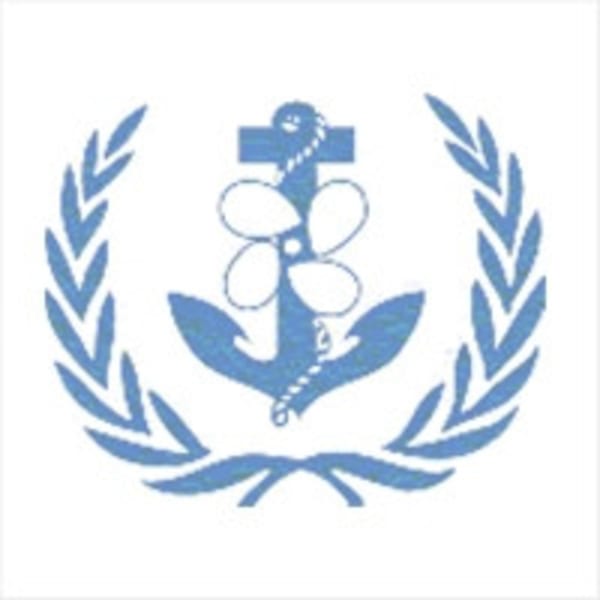
- Malmö, Sweden
The World Maritime University (WMU) was established by the UN’s International Maritime Organisation in 1983 and is IMO’s apex institution for postgraduate education and research in the maritime field.
Popular degree type
Popular education type
Popular locations
On-Campus PhD Degrees in Maritime Management
Students interested in a career in a marine-related business may find the study of maritime management a wise choice. Typical courses of study aim to improve critical thinking and hone managerial skills while focusing on issues unique to commerce conducted in a maritime setting.
Requirements for the PhD program often involve the student having already obtained a Master’s degree. Additionally, a thesis or dissertation primarily consisting of original academic research must be submitted. In some countries, this work may even need to be defended in front of a panel.
Maine Maritime Academy
A college of engineering, management, science, and transportation, maritime management - global logistics and vessel operations, graduate programs.
Pursuing a master's degree in maritime management, specializing in Global Logistics and Vessel Operations, integrates two exceptional programs, presenting you with a diverse array of career opportunities. Achieve a Master's in Maritime Management and the opportunity to obtain your U.S. Coast Guard (USCG) Mate Less Than 200 Gross Tons, Near Coastal or Inland license. This comprehensive experience involves engaging in our online business and logistics program while concurrently dedicating two years on campus to our undergraduate Small Vessel Operations (SVO) program.
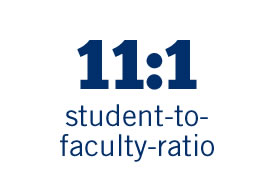
What is Maritime Management?
Maritime Management involves the strategic coordination and administration of activities within the maritime industry, covering shipping, logistics, port management, and vessel operations. Professionals in this field are responsible for ensuring the efficient and safe movement of goods and people via waterways, compliance with regulations, and optimizing operational processes. Key focus areas include maritime logistics, navigation, vessel maintenance, port operations, international trade, and regulatory compliance. Maritime Management is vital in facilitating global trade and commerce, with professionals working for shipping companies, port authorities, government agencies, and logistics firms. The field requires a comprehensive understanding of maritime laws, risk management, and the ability to navigate the complexities of the dynamic maritime industry.
What Is Small Vessel Operations?
Small vessel operations is an integral part of maritime traffic supervision and management. As a small vessel operator, you'll be responsible for operating and managing various private and commercial vessels.
MPM Certification
After you successfully complete Maine Maritime's online Master's in Maritime Management with a concentration in Global Logistics and Vessel Operations, you'll be awarded Maritime Port Manager certification from the International Association of Maritime and Port Executives (IAMPE). This certification will further prepare you for your logistics and supply chain management career.
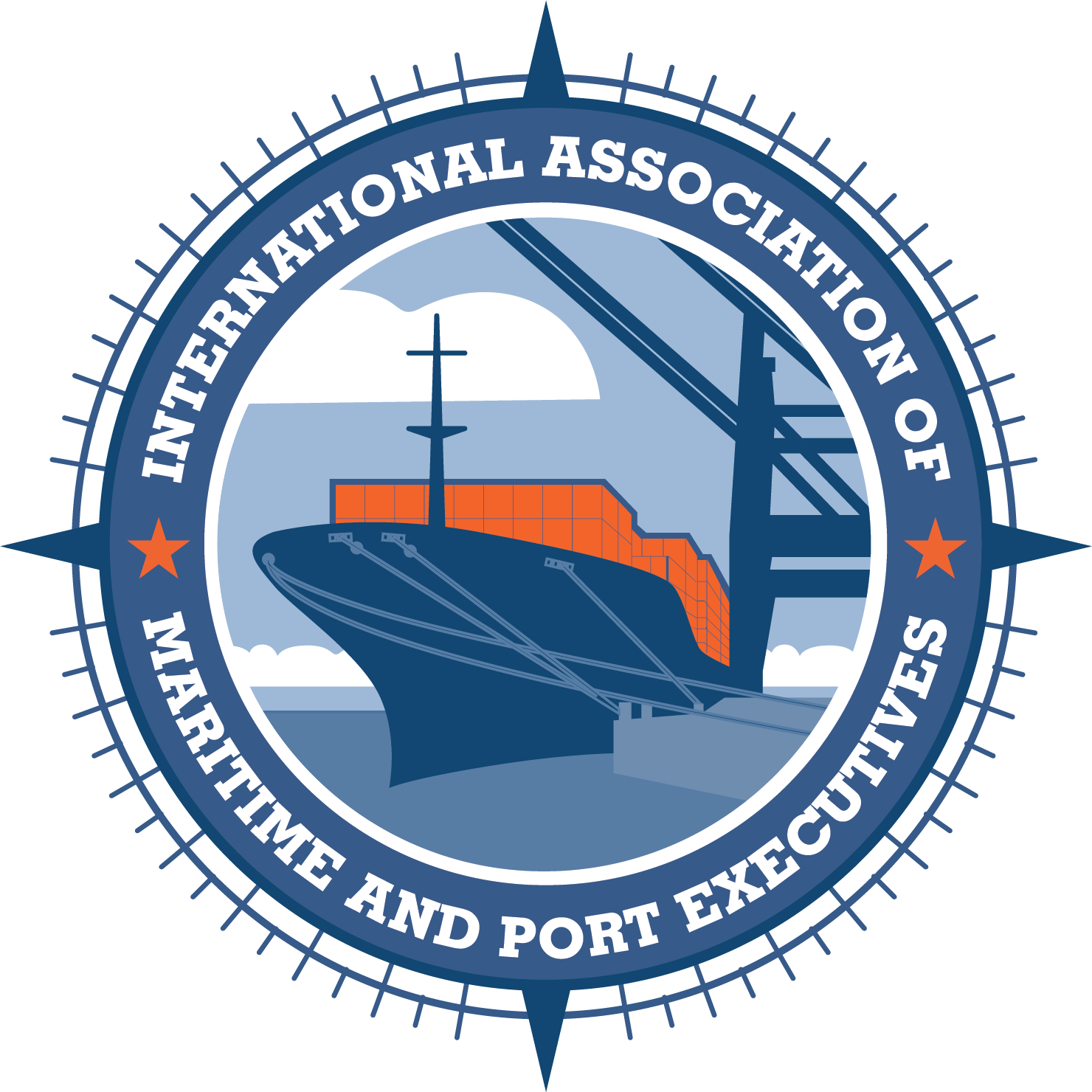
NECHE-Accredited
Maine Maritime is accredited by the New England Commission of Higher Education (NECHE), a nonprofit, non-governmental membership organization. NECHE accreditation is the regionally recognized standard and marks a solid academic program.
Alumni Perspective
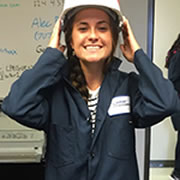
Why Choose the Master's in Maritime Management with a Concentration in Global Logistics and Vessel Operations at Maine Maritime Academy?
Earning a Master's in Maritime Management with a focus on Global Logistics and Vessel Operations at Maine Maritime Academy equips graduates with comprehensive knowledge in global logistics, preparing them for pivotal roles in the operation and management of various private and commercial vessels. This program integrates online courses in international logistics management with two years of practical experience in small vessel operations, facilitated through underway labs, simulator sessions, and sea time.
Key Program Features:
Small Online Classes
Experience an engaging and interactive learning environment with online class sizes averaging 10-20 students. Benefit from close student-faculty interaction and connect with online learners worldwide, bringing diverse backgrounds and experiences to the virtual classroom.
Access to MMA Resources
As an online student in maritime management, take advantage of complete access to Maine Maritime Academy's wealth of resources. Use the extensive databases available through the Nutting Memorial Library and reach out to the IT help desk for support with any technology-related inquiries, concerns, or challenges. Additionally, our career services team provides a range of offerings, including two on-campus career fairs annually and access to a national job board, ensuring a remarkable 90% job placement rate within six months of graduation.
Industry-experienced faculty
Learn from faculty members with real-world industry experience, bringing practical insights to the online classroom. Their expertise spans various industries, providing you with immediate and applicable knowledge.
Sea Time and Field Experience
Take advantage of Maine Maritime Academy's renowned laboratories, simulations, and cooperative work experiences to prepare for maritime careers and fulfill the 120 sea days required for the 200-ton mate's license. Engage in on-campus Small Vessel Operations classes taught by marine transportation faculty recognized nationally and internationally for their expertise.
Elective Cruise Opportunity
To enhance your experience, consider choosing a 60-day elective cruise after your first year, providing additional hands-on exposure to maritime operations.
What Can You Do With a Maritime Management Degree?
Discover a range of career opportunities with Maine Maritime Academy's hybrid master's program. Our students enjoy flexibility in pursuing careers, extending beyond the maritime sector to roles supporting industry and the broader business realm. Whether aspiring to managerial, directorial, or vice-presidential roles, our program equips you with essential skills for success. Graduates find fulfilling opportunities in logistics, production operations, procurement, inventory management, port and terminal operations, supply chain, transportation, project management, and imports/exports.
Our program alumni have thrived in esteemed companies such as Amazon , Boeing , Caterpillar , FedEx , Georgia Pacific , L.L. Bean , Shell Oil , Target , and the Walt Disney Company .
The Global Logistics and Vessel Operations concentration can additionally lead to careers as an officer aboard a tug or barge, a harbor pilot vessel, a U.S. Coast Guard or Navy vessel, a tall ship, a small passenger vessel, a ferry, a charter vessel, or a yacht.
Career Outlook in Maritime Management
Due to the need for logistics in the transportation of goods in a global economy, employment of logisticians is projected to grow 5% through 2028, according to the U.S. Bureau of Labor Statistics.
How Much do Maritime Management Graduates Make?
According to a salary survey by D.C. Velocity, the average salary for those with a master's degree in logistics-related fields is $175,817.
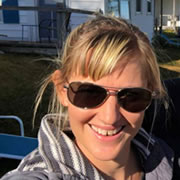
Discover a Master's Degree in Maritime Management with a special focus on Global Logistics and Vessel Operations
Immerse yourself in our comprehensive hybrid program, seamlessly blending 30 credit hours of online International Logistics Management courses with two years of on-campus study. Our online courses provide a robust business foundation with a specialized emphasis on logistics management. Meanwhile, our in-person curriculum is meticulously crafted to meet U.S. Coast Guard standards for a USCG Near Coastal Mates License, applicable to vessels of up to 200 tons.
The Global Logistics and Vessel Operations concentration kicks off on-campus annually at the onset of the fall semester. Additionally, you have the option to inquire about commencing online courses before arriving on campus.
Core Classes
- BA500 | Accounting for Managers
- BA501 | Finance for Global Managers
- BA503 | Organization Development and Managing Change
- BA505 | Strategic Marketing for Managers
- BA507 | Economics for Management Decision Making
- BA509 | Strategic Management Capstone Course
Concentration Classes
- BA511 | Fundamentals of Logistics
- BA513 | Integrated International Logistics
- BA515 | Port and Transport Terminal Operations
- BA517 | Logistics Information Systems
Small Vessel Operations Classes (on-campus)
Year 1 | 16 credits, fall semester | 5 credits.
- NS101: Introduction to Nautical Science
- NS103: Introduction to Vessel Operations
- PE100: Basic Sailing
- PE114: Ocean Survival
- USCG1: Fire Fighting
Spring Semester | 8 Credits
- NS132: Small Craft Technology & Lab
- NS135: Small Craft Construction & Lab
- NS241: Seamanship
- USCG2: Fire Fighting Live Burn
- USCG3: Lifeboat Exam
Summer Semester | 3 Credits
- CO223: SVO/VOT Cooperative Work Exp I
Year 2 | 26 Credits
Fall semester | 13 credits.
- NS122: Cargo I
- NS232: Marine Systems & Lab
- NS271: Terrestrial Navigation I
- NS272: Terrestrial Navigation Lab
- OC101: Introduction to Ocean Science
Spring Semester | 13 Credits
- NS221: Meteorology
- NS262: Navigation Rules
- NS292: Electronic Navigation
- NS293: Electronic Navigation Lab
- NS298: Topics in Small Vessel Operations
- NS299: 200 Ton License Seminar
- NS101 | Introduction to Nautical Science & Lab
- NS103 | Introduction To Vessel Operation & Lab
- NS135 | Small Craft Construction & Lab
- NS132 | Small Craft Technology & Lab
- PE100 | Basic Sailing
- PE114 | Ocean Survival
- USCG1 | Firefighting
- OC101 | Intro to Ocean Science and Lab
- NS221 | Meteorology
- NS241 | Seamanship & Lab
- USCG2 | Firefighting
- CO223 | SVO Coop 1
- NS122 | Cargo 1
- NS232 | Marine Systems & Lab
- NS271 | Terrestrial Navigation I
- NS272 | Terrestrial Navigation I Lab
- NS262 | Navigation Rules
- NS292 | Electronic Navigation I
- NS293 | Electronic Navigation Lab
- NS298 | Topics In Small Vessel Operations
- NS299 | 200 Ton License
View All Courses
Explore Small Vessel Operations Classes
This rigorous curriculum includes courses in nautical science, vessel operations, small craft technology and construction, terrestrial navigation, meteorology, and more. You’ll further develop communication and other skills valued in the maritime industry through courses in the arts and sciences.
View all courses for the small vessel operations degree.
Department Faculty
Get Started on Your Master's Degree in Maritime Management with a concentration in Global Logistics and Vessel Operations
Take the next step toward earning your master's degree through Maine Maritime Academy.
Pre-Requisites
A bachelor’s degree (B.A. or B.S.) from an accredited institution is required. An undergraduate degree in business is not required.
Admissions Dates
Students are admitted on a rolling basis throughout the year, with application deadlines in December, February, May, July, and September.
Contact an Admissions Representative
If you're ready to change or advance your Maritime Management career, please get in touch with our Graduate Enrollment Specialist. .
Rated Military Friendly®
Maine Maritime Academy welcomes veterans and has the resources to help you transition to graduate school. Please get in touch with our dedicated admissions representative for veterans .
Maine Maritime Academy welcomes motivated and academically qualified transfer students . Please contact our admissions office to learn more about transferring to Maine Maritime Academy.
Apply now and request more information
- If you want to know more please check out our FAQs or request more information .
- You can also start your online application now.
The application process is simple and there is no cost to apply! Simply submit your resume, a letter of intent, transcripts, and contact information for two professional references . Students who hold a degree from outside the U.S. or Canada must submit GRE and TOEFL test results and a transcript evaluation report. Check out all admission requirements or contact the graduate admissions specialist for more information.
Maritime Management Master’s Degrees Additional Concentrations
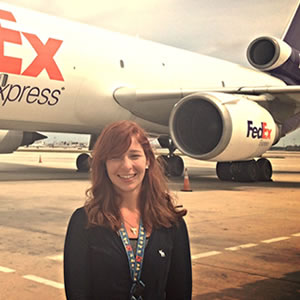
Maritime Management Concentration International Logistics Management
Request More Information
Department social media.
MAINE MARITIME ACADEMY | 1 PLEASANT STREET, CASTINE, ME 04420 | 207-326-4311 | EMAIL: [email protected]
- Campus Safety
- Mariners Athletics
- Map & Directions
- NSMV Updates
All Rights Reserved © 2024 • Web issue? Non-Discrimination Notice • Privacy Policy & GDPR Sitemap -->
graduate degree programs
SUNY Maritime offers Master of Science degrees in Shipping and Logistics and Maritime and Naval Studies. Both programs offer students the opportunity to earn a U.S. Coast Guard Merchant Mariner Deck Officer License , which, in addition to their degree, qualifies them to operate marine vessels.
The College offers a stand-alone Advanced Certificate in Supply Chain Management and a certification in International Ship Chartering. Both certificates may be earned on their own, or in conjunction with the Shipping and Logistics master's degree program.
Shipping and logistics
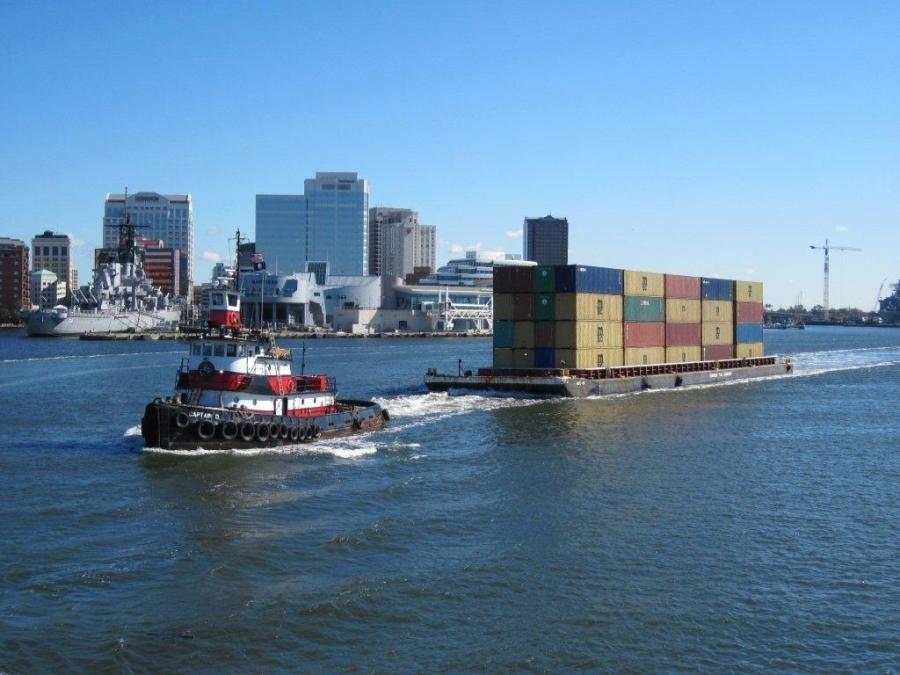
Master's Degree in Shipping and Logistics
34 credit degree program
USCG Deck License (Grad License Program)
Available online
Certificate and Advanced Certificate opportunities
maritime and naval studies
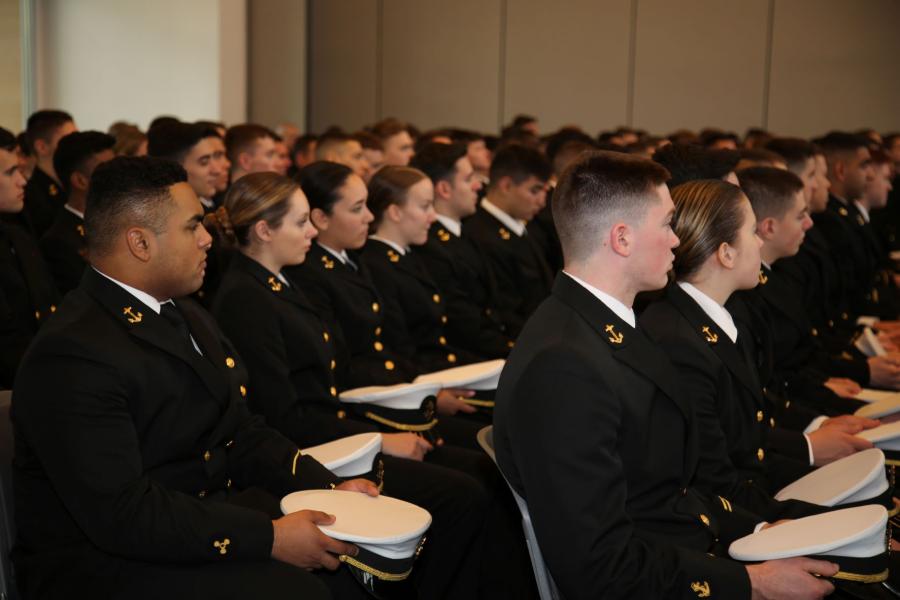
Master's Degree in Maritime and Naval Studies
31 credit degree program
Fisheries and Marine Institute of Memorial University of Newfoundland

Maritime Management
- Master of Maritime Management Overview
- Course Descriptions
- Need More Information?
- Contact Information
- Learn At MI
You’re looking for an innovative program providing professional development opportunities for career-minded professionals in the maritime industry.
Maritime-related industries and government agencies.
Program Location:
Delivered entirely online
Program Length:
30 credit hours of course work including a major project and report, or 30 credit hours of course work
View Memorial University Calendar
Application Deadline:
Fall Admission: May 15 Winter Admission: September 15 Spring Admission: January 15
For More Information:
Maritime Management - Master's Degree brochure
The Master of Maritime Management (MMM) is an innovative program, the first of its kind in Canada, providing professional development opportunities for working, career-minded professionals.
The online program helps provide the skills and knowledge necessary to effectively manage the diversity of operations found in the challenging maritime sector. This program is offered fully online, and applicants from the global community are invited to apply.
Option 1 requires two core courses (6 credit hours), 6 elective courses (18 credit hours), including major project and report.
Option 2 requires two core courses (6 credit hours), 8 elective courses (24 credit hours).
To be considered for admission to the program an applicant will normally possess a second class or better undergraduate degree from a university of recognized standing and will normally have:
- A Memorial University Bachelor of Maritime Studies or Bachelor of Technology, or a comparable undergraduate degree with appropriate maritime sector and business management course work; and
- Appropriate technical knowledge and relevant marine sector employment experience.
Please refer to the Memorial University Calendar for descriptions and regulations for this program.
"I had a very positive experience and got a lot out of it. I would recommend it to others involved in the marine industry."
-Captain Stephen Coady MI Graduate
Strategic Plan
Publications
MI Academic Calendar
Career Opportunities
Memorial Campuses
MI Staff Webmail
Emergency Management

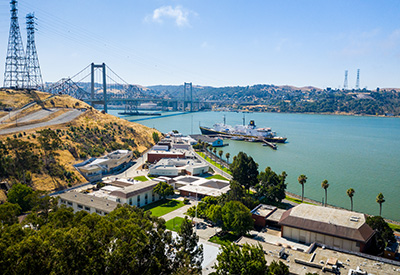
- About Cal Maritime
- History of the Academy
- Strategic Plan
- Diversity at Cal Maritime
- 2024 Commencement
- 2024 Summer Sea Term
- University Leadership
- Faculty & Staff Directory
- Employment Opportunities
- Campus News & Events
- Support Cal Maritime
- Our Next Training Ship
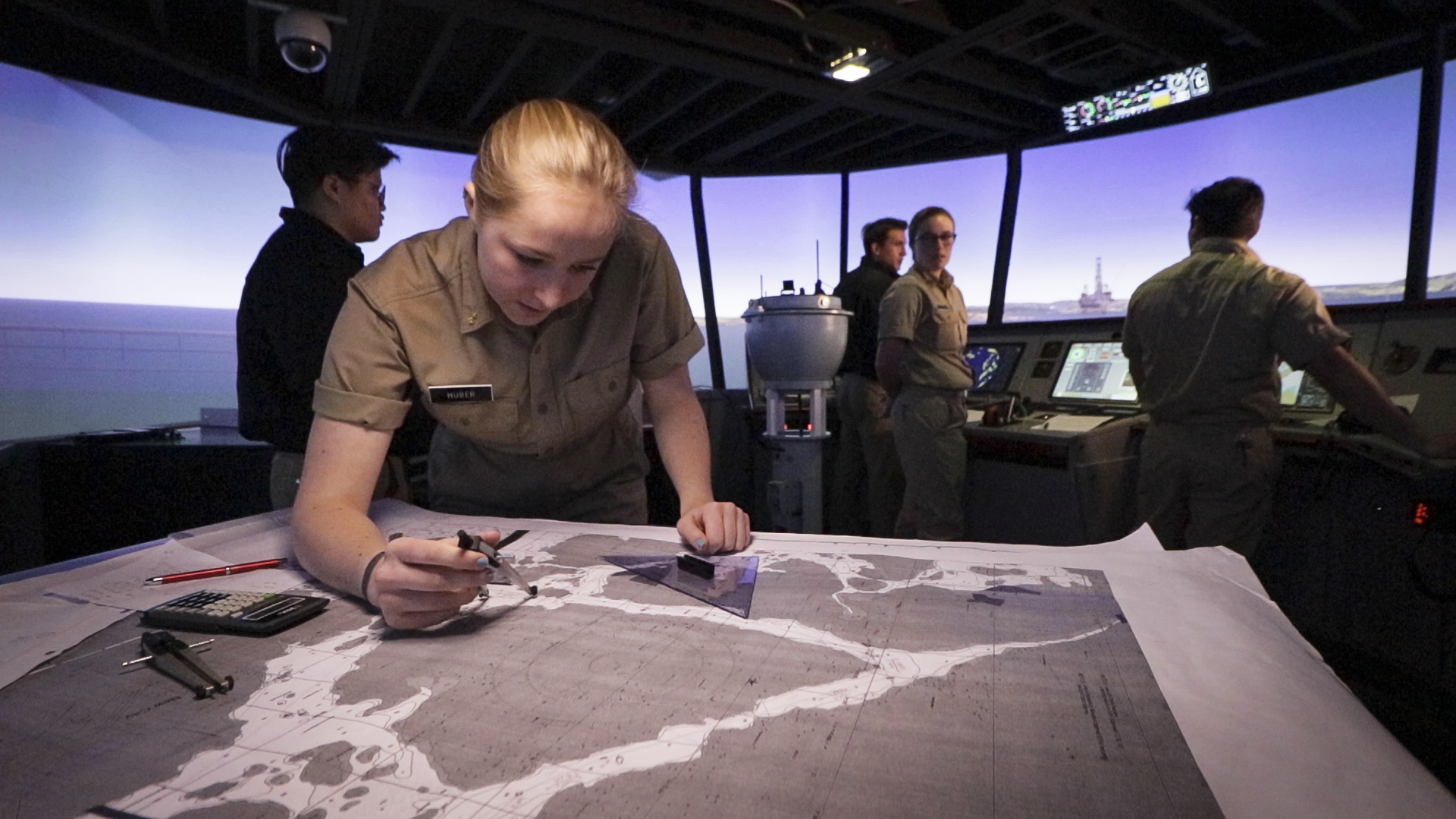
- Academic Affairs
- Undergraduate Programs
Graduate Programs
- Office of the Registrar
- Research & Innovation Office (RIO)
- Professional & Extended Learning
- Training Ship Golden Bear & Marine Programs
- Schools & Departments
- Academic Support
- Academic Catalog
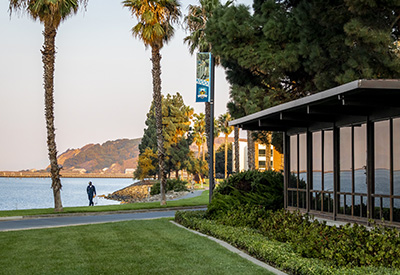
- Undergraduate Admissions
- Graduate Admissions
- Costs & Financial Aid
- Request Information
- Visit Campus
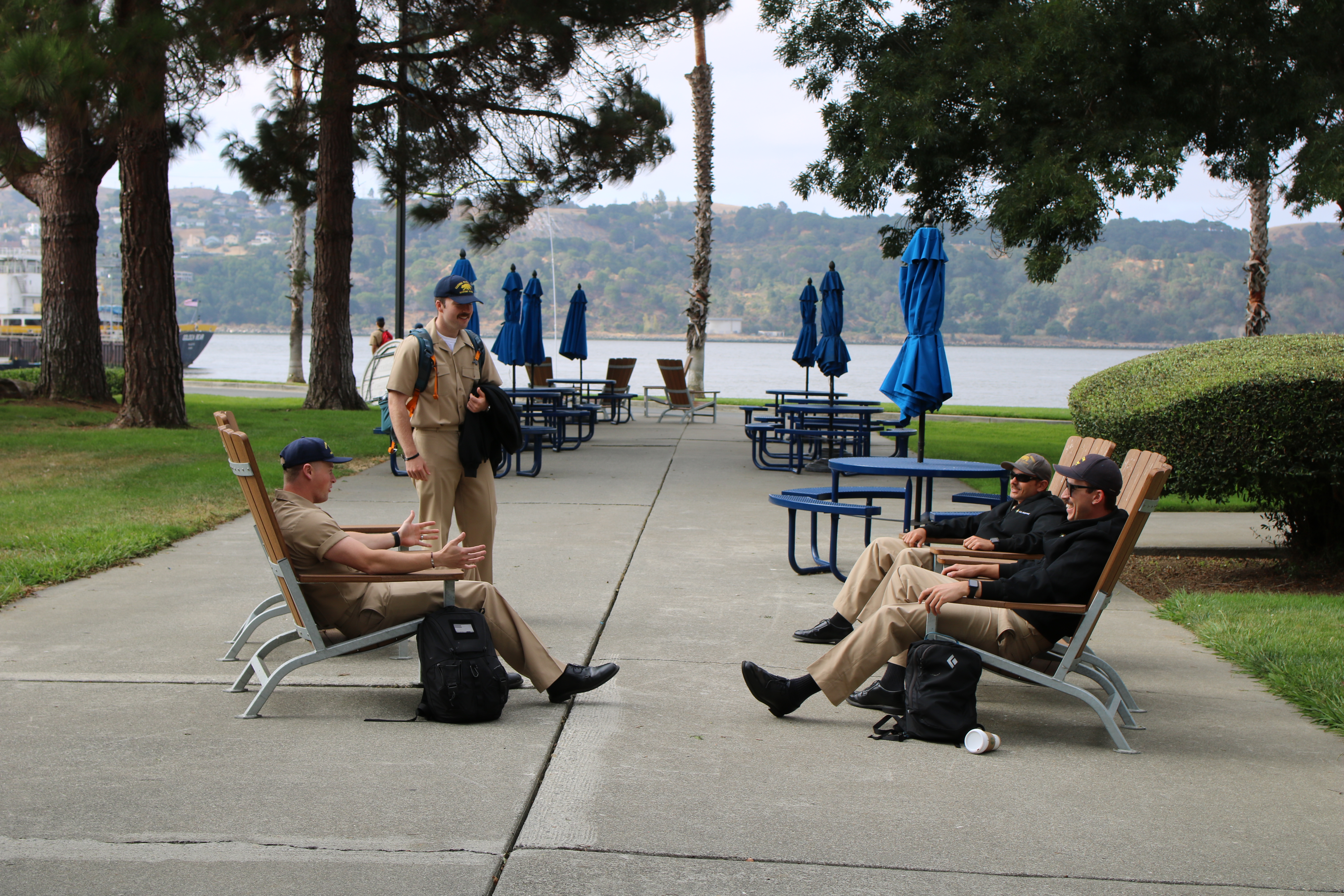
- Associated Students
- Campus Life at Cal Maritime
- Campus Safety
- Student Health Center
- The Marketplace
- Corps of Cadets
- Events Calendar
- Housing & Res Life
- Bookstore & Keelhauler Shops
- Conference & Events
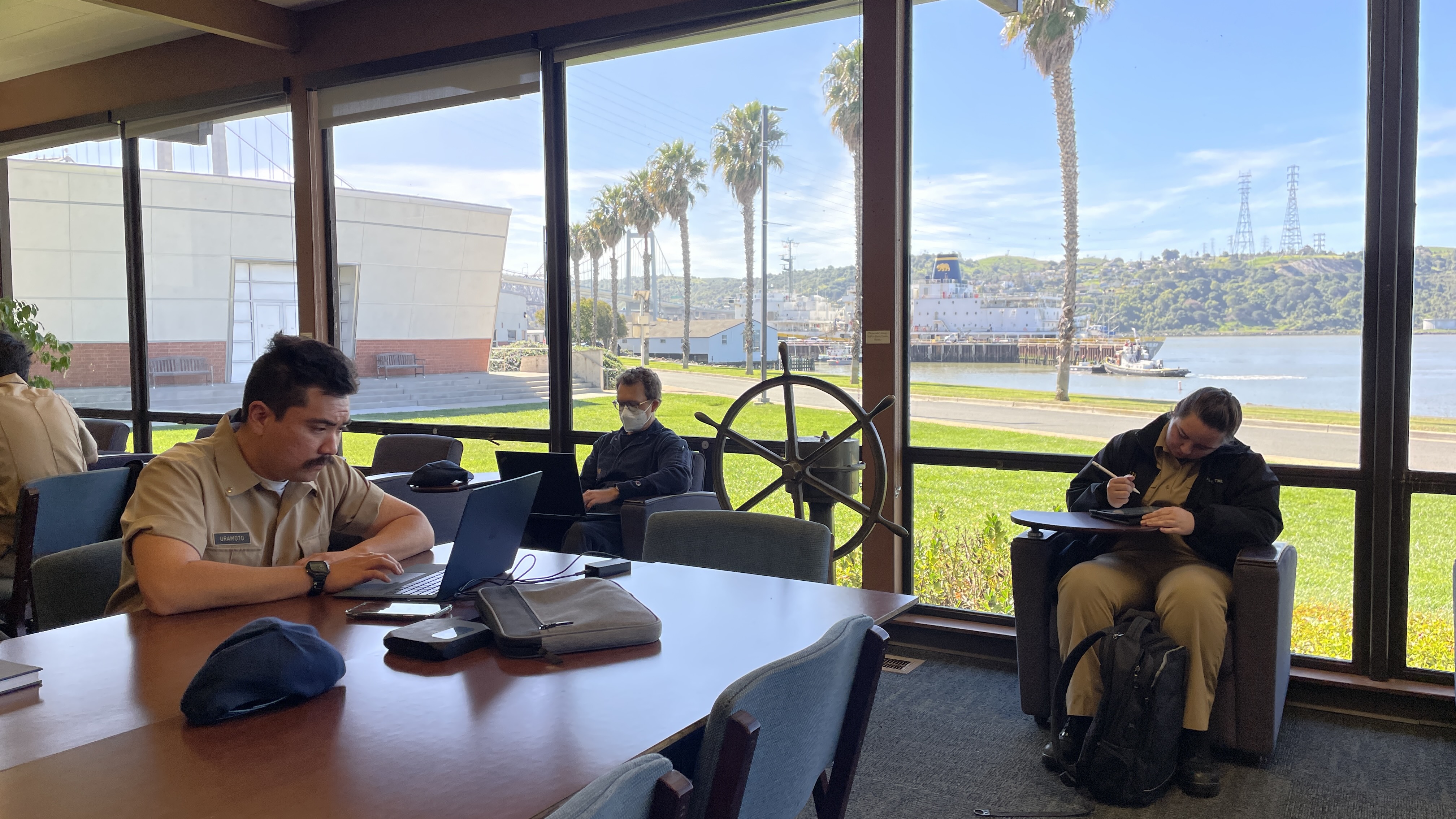
- Cashnet Online Payments
- CHRS Recruiting
- DSO (Cadets)
- DSO (Faculty)
- Facilities Service Request
- Office 365 Email
- Passport Navigate for Students
- PeopleSoft - Finance
- PeopleSoft - CHRS
- PeopleSoft - Student Systems
- StarRez Housing Portal
- Submit an IT Ticket
- The Passport for Faculty & Staff
advance your career. master your future.
Developed jointly by key University faculty, with detailed input and review from well over two-dozen businesses, agencies, professional organizations and accrediting bodies, Cal Maritime's Master of Science in Transportation and Engineering Management program serves mid-career professionals interested in gaining greater leadership and managerial skills.
Master of Science in Transportation and Engineering Management
On September 4, 2011, California State University Maritime Academy launched its first graduate degree program, a Master of Science in Transportation and Engineering Management. The inaugural class graduated in the spring of 2013. Since then, 11 cohorts have graduated, with our latest class of graduates awarded their degrees in spring 2023.
Cohorts 12 and 13 are currently in progress, and applications for fall 2024's Cohort 14 are now being accepted. Email [email protected] for more information.
Cal Maritime's Master of Science in Transportation and Engineering Management program provides advanced instruction in business and management fundamentals, coupled with specialized preparation for career advancement in the participant's chosen specialization — Transportation, Engineering Management, or Humanitarian Disaster Management.
The 10-course degree program (30 credit hours) is offered completely online with accepted students proceeding through the learning process as a cohort. Current students report that the support offered by the cohort model along with 24/7 online access are big benefits for those juggling careers and families with graduate coursework.
All graduate students take five core courses in basic management, then each graduate student takes four courses focusing on their chosen degree track of Transportation, Engineering Management, or Humanitarian Disaster Management. Finally, graduate students complete a Capstone course designed to help them demonstrate their learning through an extensive project in their work setting.
Kathy Arnold, Director of Graduate Programs [email protected] 707-654-1271

Doctor - Maritime Port Management
Distance degree programs for adults & professionals., bircham international university - adult degree programs online., doctor ph.d. degree - business & media, maritime port management via distance learning.
This Doctor Ph.D. Degree overviews both overall port's activities and maritime transport. It allows port managers to see how their individual activity fits within and affects the entire spectrum of operational and commercial activities running in the complex interface of maritime transport. The program defines ports, their constantly changing and developing functions, and their operations. It introduces key concepts, analyzes various types of ports, their evolution, and the impact left by ship technology.
Academic Supervisor : Earle Taylor More information about this academic supervisor at Bircham University Human Network. More info...
The Doctor Ph.D. Degree online via distance learning offers students the highest level of specialization a discipline can offer. More info...
* 45 to 72 academic credits above a Master's program. * Average Duration: 24 months. * Program Structure: 70% textbooks + 30% Thesis. * Admission is open for adults over 27 years of age. * Master's degree or international equivalent (5 years of study) is required for admission.
Fees include all: Program of study, textbooks, study guide, evaluation and assessment, diploma, and transcript. Cost per BIU earned postgraduate credit: 130 Euros (170 US$) Cost per transferred credit from previous education and/or professional experience if required: 20 Euros (25 US$)
45 ... 72 Academic credits Tuition Fee :Min. 5.850 Euros (7.650 US$) ... Max. 9.360 Euros (12.240 US$).
"Study via distance learning from anywhere in the world and at any time in the year." Bircham International University.
Payment plans are available upon request up to 36 monthly installments. More info...
Faculty of Business & Media via distance learning

- Doctor Ph.D. Degree
45 ... 72 Academic credits required for this distance learning degree program.
Composition:.
+ 39 Academic credits - Maritime Port Management Online + Other additional subjects + 18 Academic credits - Research methodology and final project or thesis.
+ 39 Academic credits: Maritime Port Management Online
BIU Earned Credits Credits earned through the completion of academic work at Bircham International University (Reports, Projects and Thesis).
1 BIU Earned Credit = 1 USA Semester Credit (15 hours of learning) = 2 ECTS Credits (30 hours of study). Courses list (each subject accounts for 3 academic credits): You may study any subject as an independent online continuing education course. More info...
Postgraduate level continuing education course. Previous knowledge in this field of study is required.
601MAM - International Distribution 602MAM - International Transport 603MAM - Maritime & Port Economics 604MAM - Hinterland Transportation 605MAM - Transportation & Logistics 606MAM - Port Integrated Logistics 607MAM - International Trade Operations 608MAM - Terminal Management 609MAM - Shipping Management 610MAM - International Law 611MAM - Marine Vessel Management 612MAM - Risk Management & Insurance 613MAM - Maritime Port Management More info...
Bibliography: Maritime Port Management via distance learning The corresponding textbooks are included in the fees. Once the fee has been paid, the books may take between two to five weeks to reach your address. Bircham International University offices may inform you at any time of the status of your books. If the book is in English, the required report must be written in English unless you have requested to write it in other language and have gained Bircham International University authorization. More info... Click here to access the recommended bibliography.
+ Additional courses may be selected from other modules in the Faculty of Business & Media from Bircham International University if required. This selection must be approved by the Distance Learning University Education Board. For example: Logistics .
Research work resources and network - Doctor - Maritime Port Management:
AAPA - American Association of Port Authorities ABTC - Associação Brasileira de Transporte Logística e Carga ABTLP - Associação Brasileira de Transporte e Logística de Produtos Perigosos APP - Associação dos Portos de Portugal ATPYC - Asociación Técnica de Puertos y Costas ETWF - European Transport Workers' Federation FNTR - Fédération Nationale des Transports Routiers FTA - Freight Transport Association IAMPE - International Association of Maritime and Port Executives IAPH - International Association of Ports and Harbors IFWLA - International Federation of Warehousing and Logistics Associations IMO - International Maritime Organisation IMTM - Institut Méditerranéen des Transports Maritimes ITWF - International Transport Workers' Federation PMAC - Port Management Association of the Caribbean PMAESA - Port Management Association of Eastern & Southern Africa PMAWCA - Ports Management Association of West and Central Africa PMO - Ports & Maritime Organization More info...
Joining the proper association is the best way to become an updated professional. Bircham International University graduates may join many professional associations. Membership requirements for each association may vary depending on the degree program, specialization and graduate resume en each occasion. BIU can not guarantee membership in all instances. BIU does not intermediate in these procedures. Bircham International University provides a list of available memberships and professional references from each faculty where some BIU graduates may belong. Contact directly the ones you select. More info...
+ 18 Academic credits (Research methodology and final project or thesis. More info... ).
Admission requirements: Doctor - Maritime Port Management
Bircham International University distance learning degree admission requirements differ depending upon the Faculty and the major of study. There is no discrimination with respect to race, color, sex, beliefs and/or religion. A minimum of 30% of the total number of credits required by any adult degree program syllabus has to be transferred from previous education and/or validated from professional experience in order to gain admission. A maximum of 20% of the total number of credits required by the distance learning degree program can be transferred from professional and life experience. More info...
Click to Download... Application for Admission
Learning outcomes: Doctor - Maritime Port Management
The following learning outcomes are compatible with the European Qualifications Framework (EQF) for lifelong learning and continuing education. The EQF directives facilitate acceptance of this course credits by many higher education institution. These learning outcomes are achieved after completion of this course with a passing grade. Better grades will demonstrate higher analysis, evaluation and critical thinking skills. More info...
EQF LEVEL 6. Advanced knowledge and critical understanding. Outcome resulting from course content assessment and its applicability to problem solving. The student's ability to combine the different parts of the text and to form a new coherent and harmonic final report will determine the critical understanding of the subject and an advanced knowledge of Maritime Port Management. The student written report style, content, and structure play an important role in the assessment and applicability of the knowledge about Maritime Port Management to different Business & Media decision making scenarios and problem-solving. More info...
EQF LEVEL 7. Advanced knowledge and critical thinking. Outcome resulting from written critical thinking and its applicability to problem solving. The student will contrast and evaluate the learned material with his/her own knowledge and experience to express an opinion about Maritime Port Management, to consider the practical application of the key concepts, and to argue the conclusions along the written report. Personal judgments and opinion should be based on sound criteria and must be clearly discussed. More info...
BIU adapts each Distance Learning Higher Education degree program to the needs of each student. More info...
Maritime Port Management Online
Recognition - Distance degree programs - More info... Accreditation - Distance Learning University - More info... Degree Legalization - Graduate Services - More info... Acceptance of these Distance Learning Higher Education academic credits is always the prerogative of the receiving institution or employer. Recognition criteria differ depending on each educational institution, or company policy, or country legal framework.
Maritime Business Management
Masters of science.
The Master of Science in Maritime Business Management (MSMB) is designed to give students the knowledge and skills to become creative problem solvers and thus to succeed in a variety of senior business, management, and leadership positions. The program emphasizes that good ideas are not enough and that implementation is what separates excellence from mediocrity in management and leadership. The MSMB program prepares students for executive leadership responsibilities in maritime business and supply chain management, in both the public and private sectors, by helping students develop technical expertise and a strategic mindset to improve the performance of the many facets of the complex global transportation systems--preparing them for careers in local, regional, or global maritime business and supply chain management.
The degree is offered in a 17-month executive format with 9 three-credit courses and one four-credit capstone course (total 31 credits).
*In response to the global pandemic COVID19, we have migrated to an online format. We will continue virtual format for the foreseeable future.
Apply Today!
Why get your Masters in Maritime Business?
With 90% of global commerce moving via ship, and with other maritime-related sectors such as off-shore wind expanding, qualified maritime professional managers are needed to meet the ever increasing needs of the maritime industry and related enterprises.
What makes the Masters in Maritime Business program different from an MBA program?
The MSMBM’s curriculum balances core business management courses, such as financial analytics and organizational behavior, with specific maritime industry related topics, such as Maritime Law and Global supply chain management.
What kind of coursework is required?
The MSMBM program includes a combination of:
- Group discussions and exercises;
- Case-study analysis;
- Project research;
- Group and individual presentations;
- Table-top, workshop and other team-building and problem-solving exercises.
- Readings from textbooks, case studies, peer-reviewed articles, professional journals, doctrinal manuals and emergency management-related hand books
- Research papers on relevant topics and course readings;
- Tests and examinations;
- Book and maritime journal article reviews;
- The MSMBM capstone seminar is designed to develop research, analytical, briefing and writing skills to assist students in identifying a maritime-related problem in their organization, community or related to a global issue and developing sound recommendations. The capstone seminar develops analytical competencies and written and oral communications skills, all critical for operating in any professional environment.
What will you learn?
- Maritime-based logistics and supply chain operations processes, tools, and best practices;
- Skills to work effectively as an organizational manager and communicate and coordinate effectively with employees, service partners and customers in the maritime industry;
- Legal and regulatory considerations impacting the maritime industry;
- Risk assessment skills to Identify threats to maritime security and supply chains;
- Fundamental financial management concepts central to the maritime industry in performing sound financial analysis and planning;
- Research, analytical and communications skills to formulate practical and implementable maritime-based organization strategies and plans to enhance maritime operations and better manage and mitigate risks and threats to maritime operations;
- Skills and knowledge to create, coordinate and implement policies to assist enterprises and organizations in more effectively operating in the global market and complying with relevant maritime laws and regulations;
- Appropriate maritime law and maritime-related human resource regulations and best practices in managing personnel in the maritime environment;

Visit U of I
Learn about the many reasons the University of Idaho could be a perfect fit for you. Schedule Your Visit
- Discover a Career
- Find a Major
- Experience U of I Life
More Resources
- Admitted Students
- International Students
Take Action
- Find Financial Aid
- View Deadlines
- Find Your Rep

Helping to ensure U of I is a safe and engaging place for students to learn and be successful. Read about Title IX
Get Involved
- Clubs & Volunteer Opportunities
Campus Recreation
- Student Government
- Sustainability Center
- Academic Assistance
- Safety & Security
- Career Services
- Health & Wellness Services
- Register for Classes
- Dates & Deadlines
- Financial Aid
- U of I Library

Homecoming Oct. 14 - 21
Join other Vandal families for a week of celebration and Vandal traditions. View Calendar
Stay Connected
- Upcoming Events
- Here We Have Idaho Magazine
- Support Services
- About Moscow
- Commencement
- Dads' Weekend
- Moms' Weekend

- U of I Retirees Association
UIRA has a membership of nearly 500 from every part of the University. Learn about UIRA
- Submit Class Notes
- Make a Gift
- View Events
- Vandal Pride Products
- Vandal Voyagers Program
- Alumni Chapters
- University Magazine
- Alumni Newsletter

Gym memberships and wellness class passes are available for faculty, staff and their spouses. Get Healthy
Common Tools
- Administrative Procedures Manual (APM)
- Class Schedule
- ITS Tech Support
- Academic Dates & Deadlines
- Daily Register
- Faculty Senate
- Staff Council
Application Management
Office of admissions.
Physical Address: University of Idaho Bruce M. Pitman Center 709 Deakin Street Rm 117 Moscow, ID 83844
Mailing Address: University of Idaho 875 Perimeter Drive MS 4264 Moscow, ID 83844-4264
Phone: 208-885-6326
Fax: 208-885-9119
Email: [email protected]
Web: Office of Admissions
Physical Address: University of Idaho Boise 322 E. Front St Boise, ID 83702
Email: [email protected]
Web: Boise Center
Coeur d'Alene
Physical Address: University of Idaho Coeur d'Alene 1031 N Academic Way Suite 242 Coeur d'Alene, ID 83814
Web: Coeur d'Alene Center
Idaho Falls
Physical Address: University of Idaho Idaho Fall 1776 Science Center Dr. Suite 306 Idaho Falls, ID 83840
Web: Idaho Falls Center

IMAGES
VIDEO
COMMENTS
Maritime Economics and Business This RPA focuses on the optimization of shipping, ports and their sustainable management from economic and logistics/supply chain perspectives. It explores all areas of shipping and port management, and offers the chance of carrying out in-depth investigation within the fields of maritime economics and policy ...
Marine Affairs Ph.D. Overview the focus of the Ph.D. program is on coastal/ocean management, policy, and law and will concentrate on the following areas, which are not mutually exclusive: Coastal management Fisheries management Marine ecosystem management Maritime transportation and ports National and international ocean policy Marine human ecology The University of Rhode Island has a […]
Maritime Business Administration Toggle Maritime Business Administration. Maritime Business Administration - BS; Maritime Business Administration - BS/ MMB, 3+2 Program ... The Marine and Coastal Management and Science (MCMS) PhD in the Department of Marine and Coastal Environmental Science is an interdisciplinary program that is firmly ...
The Maritime Management program is designed to advance the professional development of experienced managers, graduates and professionals in the international Maritime industry by extending their knowledge and equipping them with broad research and specific management skills, enabling them to make a key leadership contribution in their chosen work.
The Ph.D. program in Marine and Coastal Management and Science (MCMS) at the Department of Marine Sciences, Texas A&M University at Galveston seeks to train the next generation of researchers and practitioners to address pressing problems at the nexus of the human and physical environment. About the program.
Admission into the Ph.D. program in Maritime Studies is normally restricted to applicants holding a Master's degree or its equivalent with relevant background and core knowledge in, but not limited to, criminology or criminal justice, emergency management, engineering, human kinetics, maritime studies, psychology, or sociology.
MARA 673 International Maritime Industry Graduate Management Experience. Credits 1 to 4. 1 to 4 Lecture Hours. Combines clasroom and graduate research work with international travel and provides the student direct contact with maritime industry managers. The trip emphasizes cultural and historical aspects of the maritime industry outside of the ...
The PhD Programme in Nautical Operations is the preferred Programme in the field and attracts good applicants nationally and internationally from major maritime nations. Individuals graduating from the Programme are in demand both nationally and internationally because they have a strong and relevant research-based expertise and the ability to ...
STEM OPT. The School for Marine Sciences & Technology's (SMAST) PhD in Marine Science and Technology program emphasizes societal need-driven research and learning in an interdisciplinary environment. The PhD program focuses on observations, modeling, experimentation, and theory in the areas of ocean sciences, ocean technology, and marine policy.
Minimum entrance requirements are: Bachelor's Degree in any discipline. MSc Degree in any discipline. Knowledge of English Language (C1 Certification is required) Working experience is a plus. The Ph.D. Degree in Maritime Studies requires original research for its completion. The areas of research are presented but not limited to the below list:
On-Campus PhD Degrees in Maritime Management Students interested in a career in a marine-related business may find the study of maritime management a wise choice. Typical courses of study aim to improve critical thinking and hone managerial skills while focusing on issues unique to commerce conducted in a maritime setting.
Maritime Management involves the strategic coordination and administration of activities within the maritime industry, covering shipping, logistics, port management, and vessel operations. Professionals in this field are responsible for ensuring the efficient and safe movement of goods and people via waterways, compliance with regulations, and ...
graduate degree programs. SUNY Maritime offers Master of Science degrees in Shipping and Logistics and Maritime and Naval Studies. Both programs offer students the opportunity to earn a U.S. Coast Guard Merchant Mariner Deck Officer License, which, in addition to their degree, qualifies them to operate marine vessels.. The College offers a stand-alone Advanced Certificate in Supply Chain ...
The Master of Maritime Management (MMM) is an innovative program, the first of its kind in Canada, providing professional development opportunities for working, career-minded professionals. The online program helps provide the skills and knowledge necessary to effectively manage the diversity of operations found in the challenging maritime ...
On September 4, 2011, California State University Maritime Academy launched its first graduate degree program, a Master of Science in Transportation and Engineering Management. The inaugural class graduated in the spring of 2013. Since then, 11 cohorts have graduated, with our latest class of graduates awarded their degrees in spring 2023.
Maritime Port Management via distance learning. This Doctor Ph.D. Degree overviews both overall port's activities and maritime transport. It allows port managers to see how their individual activity fits within and affects the entire spectrum of operational and commercial activities running in the complex interface of maritime transport.
The Master of Maritime Administration and Logistics is a professional graduate management degree that helps the student develop an integrated understanding of the centrality of ports and interconnected transportation systems to the international and domestic commerce of the United States and to the general global trading system.
Masters of Science. The Master of Science in Maritime Business Management (MSMB) is designed to give students the knowledge and skills to become creative problem solvers and thus to succeed in a variety of senior business, management, and leadership positions. The program emphasizes that good ideas are not enough and that implementation is what ...
Physical Address: University of Idaho Bruce M. Pitman Center 709 Deakin Street Rm 117 Moscow, ID 83844. Mailing Address: University of Idaho 875 Perimeter Drive MS 4264
About 300 students graduate each year. The Faculty of Pharmacy also provides postgraduate training (1-year internship) in pharmacoeconomics and management, pharmaceutical technology, pharmaceutical chemistry and pharmacognosy. The Faculty of Pharmacy also offers PhD fellowships, with the PhD program lasting 3-4 years, other doctoral programs ...
The Faculty provides postgraduate training (internship and residency) in almost every medical specialty. PhD and other doctoral programs are also available. A large variety of postgraduate education programs are available, ranging from 72 to over 500 academic hours. Every year, over 7,500 of physicians study at the Faculty.
Adfress: Street, Moscow, Russia Phone:+7 (000) 000-00-00 Email: [email protected]